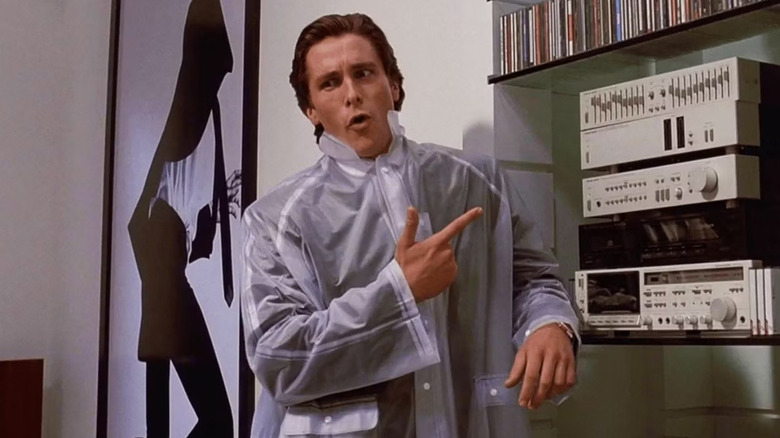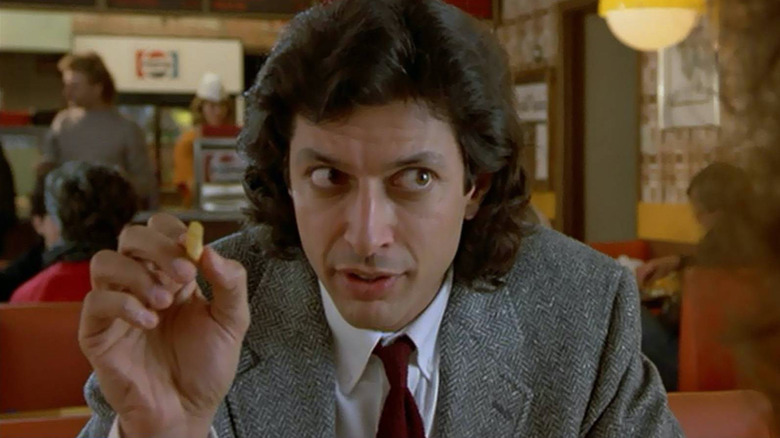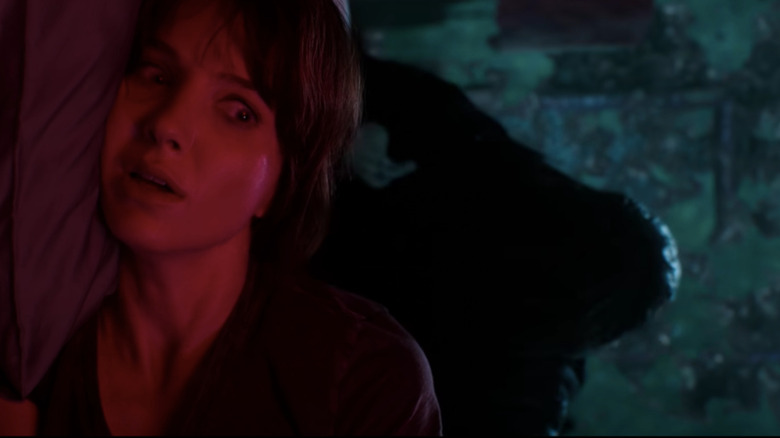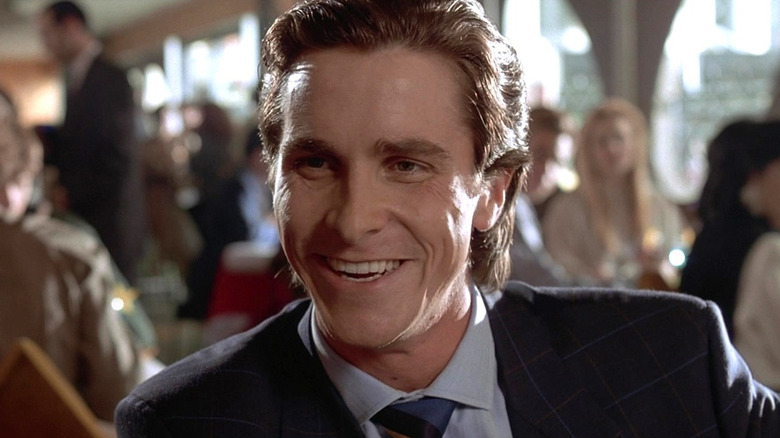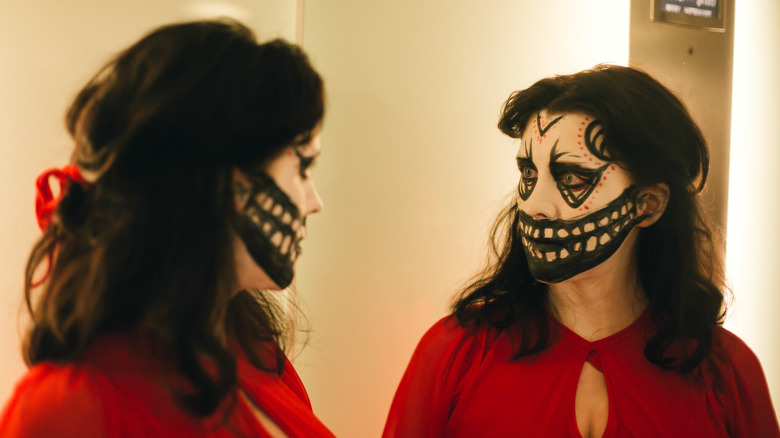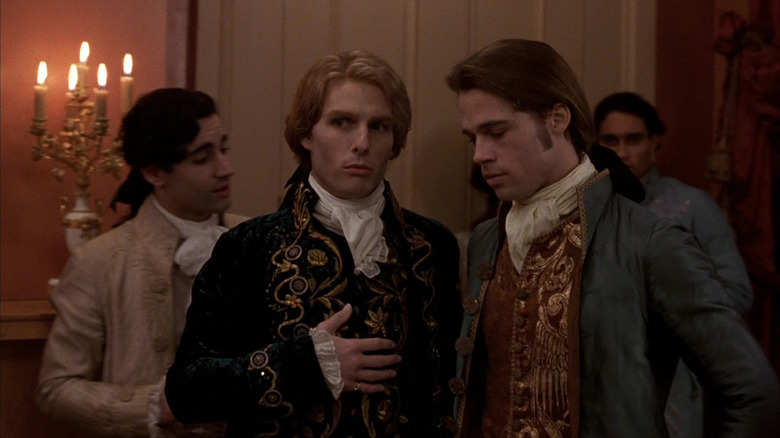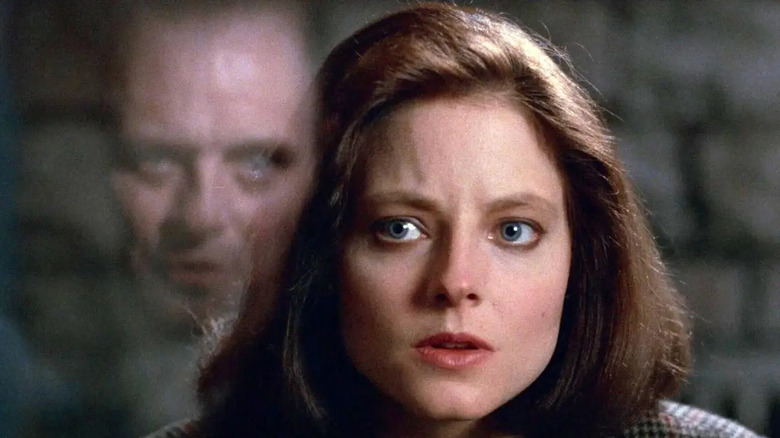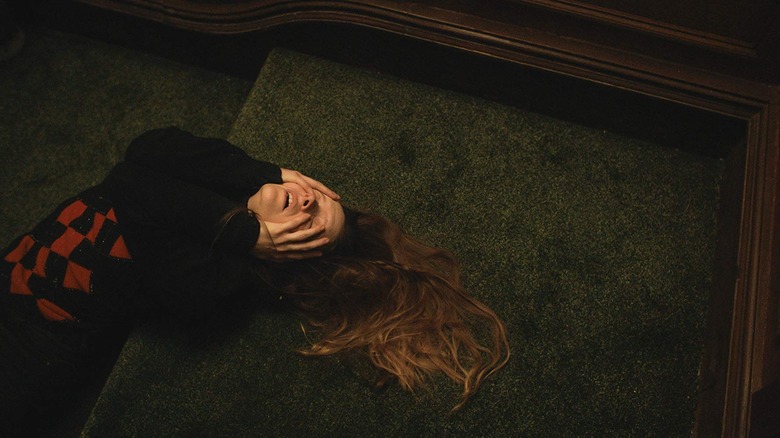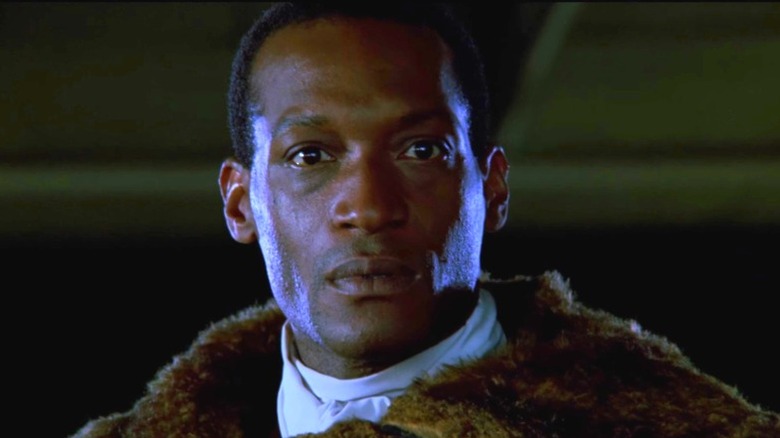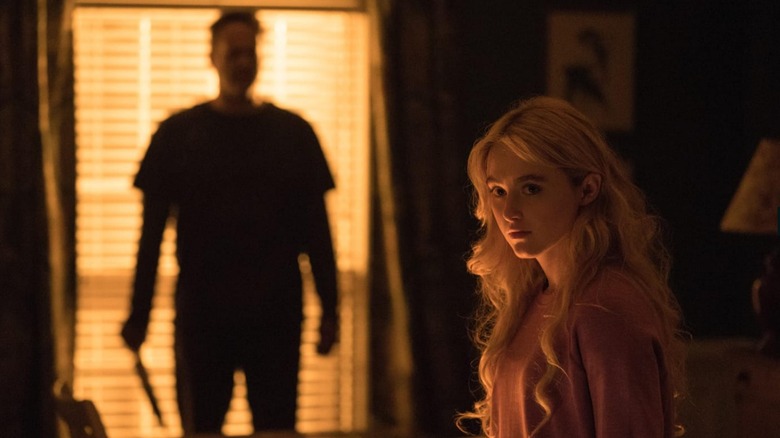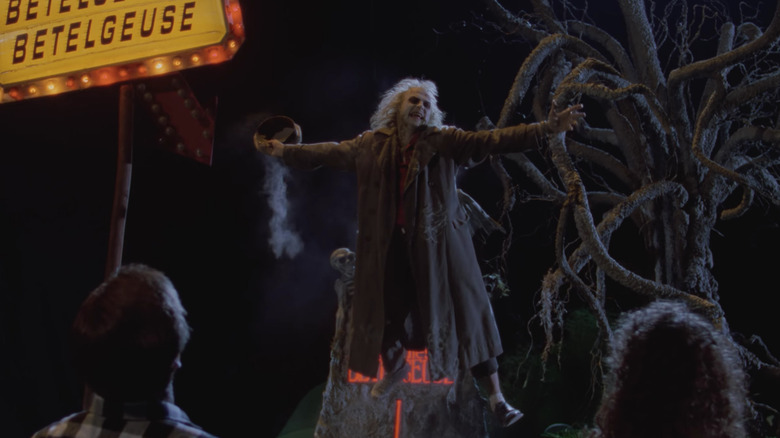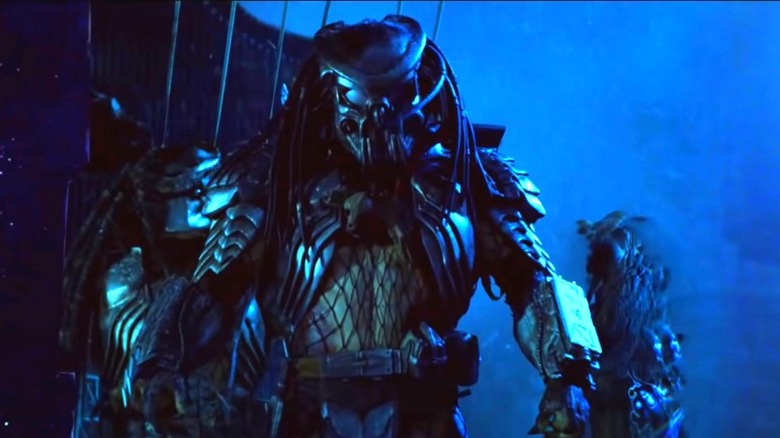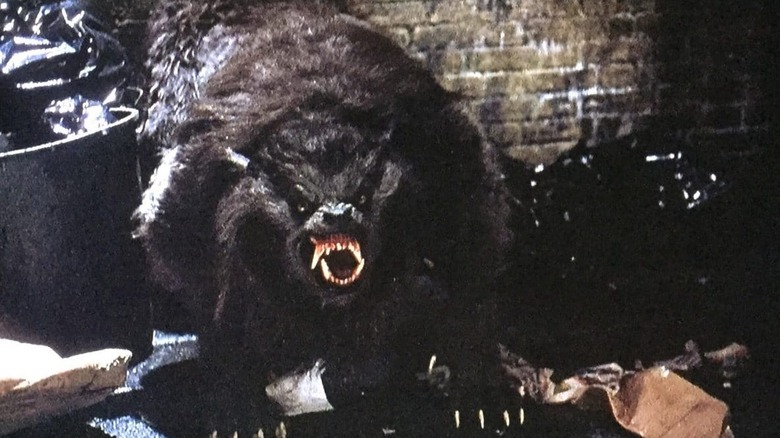Horror Movies That Make Us Root For The Villain
Don't lie. It's happened to all of us. You're watching the latest must-see horror movie in a dark room, eagerly perched on the edge of your seat with popcorn in hand, and deep down, you're secretly hoping that the bad guy ends up on top.
For most horror movie villains, longevity is the name of the game, and with that comes a certain likeability that's automatically baked into their constantly-rising body counts. Seriously. Freddy, Jason, Chucky, and Michael Myers? Each one of these deranged killers may be why our heroes spend the majority of their respective films sprinting around wide-eyed and panicked, but for viewers, they're the reason we keep coming back.
If you find yourself agreeing with all this, don't worry. It's okay to enjoy horror movies that actively make us root for the villain. In fact, sometimes, it's actively encouraged. You don't have to look far for a big screen baddie with a sympathetic streak, either. So, with that in mind, here's a round up of our favorite hackers, slashers, monsters, and murderers that, if we were given the choice, we'd cheer for before their righteous, day-saving foes 100% of the time, every time.
The Fly
Director David Cronenberg's 1986 remake of Vincent Price's 1958 classic "The Fly" will forever be infamous for the gloopy and prolonged transformation of Jeff Goldblum's Seth Brundle into the half-man, half-insect known as the Brundlefly. However, amid all the vomiting and limb-dropping, Cronenberg and Goldblum splice in an earnest moment of sympathy for their movie monster.
The scene in question happens shortly before the Brundlefly loses the last remaining shred of his humanity. An almost fully-transformed Seth candidly confesses to his concerned girlfriend Veronica, played with the perfect balance of heartbreak and horror by Geena Davis, that he wants to become the world's first insect politician. His aim? To bring order to the twitchy, chaotic, and often vicious bug world.
It's an unexpectedly tender scene in a movie that's anything but. As Seth forces out the painful admission that he's "an insect who dreamt he was a man, and loved it. But now the dream is over, and the insect is awake," audiences are encouraged to stop covering their eyes for a brief moment, if only to wipe away their tears. It's proof that, underneath all the gunk, a human soul still lurks somewhere within the monster, a point that's hammered home during the film's heartbreaking final moments.
Malignant
In "Malignant," horror maestro James Wan puts his own spin on the evil twin trope by hiding his villain in plain sight and making the big bad the dark side of his protagonist's persona. Okay, okay, we get it. This one's a bit of a funny pick as, technically, some viewers might consider the hero of "Malignant," Madison Mitchell (Annabelle Wallis), and her parasitic twin brother, Gabriel (Marina Mazepa), two separate people. After all, for most of the movie, that's what we're led to believe.
However, as the film progresses, we eventually learn that Madison and Gabriel are one and the same: a pair of twins fused together by a problem in the womb, with Gabriel latched onto Madison's back and determined to cause murderous havoc. Root for one, and you're inevitably rooting for the other. As Wan's modern take on the Edward Mordrake myth unfolds, we realize that, in order to beat the baddie, Madison must regain control of her body, and as Gabriel's grizzly kill count increases, we're cheering for her every step of the way.
Admittedly, it is a bit weird, but as Wan later admitted, that was actually the appeal. "Part of my love for the horror sci-fi genre is you can kind of come up with a really out-there story, and people are more willing to accept it," the "Aquaman" director told ComingSoon.net. "That's part of the fun for me. I like strange and weird things."
American Psycho
With his slick suit, high-flying career, and the best business cards on Wall Street, Patrick Bateman is a stone-cold killer both in the office and with an axe ... or is he? In director Mary Harron's blade-sharp dissection of corporate bloodlust, star Christian Bale introduces us to someone who seemingly has everything anyone could want in life. Sure, from time to time he kills the occasional colleague or love interest, but isn't that the cost of staying at the top? According to Bateman, it is.
However, as Harron's psychological horror is unpacked, we meet someone far less confident: a fractured individual who's more of an emotional mess than an emotionless monster. As the walls start to close in on Bateman and his mental trauma hits fever pitch, we're left confused about who Bateman really is. So is he. Throw a heady dose of humor into the mix ("Do you like Huey Lewis and The News?"), and, despite his murderous streak, all of a sudden we're starting to like this guy.
"One thing I liked about the novel was the way it presented the character; there were a lot of scenes where he was kind of a buffoon," the director told Little White Lies, commenting on Bateman's sometimes goofy nature. "It's more like a monster movie; you have someone who ... doesn't have normal instincts and is filled with terror and rage. She adds, "How do they operate in the world? It was almost like someone from another planet trying to fit in on Earth."
Prevenge
The directorial debut of "Garth Marenghi's Darkplace" star Alice Lowe introduces us to Ruth, a heavily pregnant woman who believes that her unborn baby is telling her to kill people. However, as this slash-happy tale plays out, we soon learn about the heartbreaking personal trauma that led this mother-to-be to commit such violent acts.
Putting the primary story of "Prevenge" aside, Lowe's film also acts as a darkly comedic comment on the often-unseen pressures that accompany childbirth and the roller coaster ride that defines becoming a mother. The inclusion of those elements imbues Ruth with an unexpected sense of down-to-Earth sympathy.
It's also something that Lowe was quick to comment on in interviews surrounding the film's release in 2017. "I really wanted it to be a meditation on how people treat pregnant women in society and as individuals, what it feels like to go through the journey of having a baby and how it's not always the rosy, pastel-colored dream that it's cracked up to be," she told the Big Issue North. "When you're pregnant it's almost like being a werewolf ... You've got these hormones coursing through you that give you these special powers. I wanted to get that in the film."
Interview with the Vampire
The undead duo in "Interview with the Vampire," Lestat de Lioncourt (Tom Cruise) and Louis de Pointe du Lac (Brad Pitt), share the curse of blood-sucking immortality. However, while the former revels in his cruel acts, the latter is very much weighed down by a lingering human conscience. As the ramifications of Louis' deal with the devil begin to hit home, he dedicates his never-ending lifespan to gaining a better understanding of what he now is. Despite being a pale, cat-eyed creature of the night, Louis' quest for meaning is undeniably human, and it's one that most viewers should relate to — on some level, at least.
From the death of his beloved (if sadistic) adopted daughter, Claudia (Kirsten Dunst), to the painful discovery that there may not be an answer to the question he's spent his afterlife trying to solve, Louis' journey is not without its own share of tragedy. To make matters worse, a sense of inescapable guilt travels with him all along the way, like the ghost of the mortal life he left behind.
"He was half-human and half-vampire but he never quite lost his human element and perspective," suggested the film's director, Neil Jordan, during an interview with SciFiNow commemorating the movie's 25th anniversary. "That's what I liked about it and that's what I tried to do the movie about."
The Silence of the Lambs
You don't always need a tragic backstory to make you root for a movie villain. Sometimes, they're simply so charismatic that you end up cheering for them despite knowing better. That's certainly the case with "The Silence of the Lambs" villain Hannibal Lecter, a former psychiatrist, a flesh-hungry cannibal, and one of the most charming movie terrors ever committed to celluloid.
For the majority of Jonathan Demme's award-winning 1991 movie, Sir Anthony Hopkins' chianti and fava bean-loving serial killer is confined to a maximum security prison cell. It's during this time that Jodie Foster's rookie FBI agent Clarice Starling forms an unlikely bond with the murderer. Weirdly enough, as we watch Hannibal help Clarice track down Buffalo Bill, Starling isn't the only one who's warming to Lecter in spite of their better instincts. We are, too.
Perhaps this can be traced back to the ways in which Hopkins crafted the character, lifting it from the pages of Thomas Harris' book to the big screen. Over the years, it's widely been reported that the "Elephant Man" star based his portrayal of Lecter on a tarantula, but more recently Hopkins admitted that he was inspired by a scary drama instructor when he brought the character to life.
"There was a teacher we had, a Stanislavsky method teacher, and he was lethal. He was very charismatic, and he was deadly. He would rip you apart," Hopkins told Vanity Fair. "He'd just smirk, and he'd say, 'No. Do it again' ... I based it on him: 'No, Clarice.'" What better analogy for someone who you learn to love to hate than an old teacher?
Saint Maud
Recent years have seen an uptick in horror movies centering on mental health, with a specific focus on the ways in which society treats those who are the most vulnerable. These themes take the spotlight in director Rose Glass' stark seaside horror film, "Saint Maud." In this bleak tale, we follow Morfydd Clark's lonely and damaged heroine, a palliative nurse sent to provide end of life care to a terminally ill patient. However, it's not long before we discover that Maud has her own set of demons, one that can't be easily cured.
As her fascination with the power of God gives way to hallucinations and her own spiraling mental health, Maud slips through society's cracks and falls tragically out of reach. Ultimately, her misguided choices make her the villain of Glass' understated feature debut, but make no mistake: We're rooting for a savior to rescue Maud every step of the way.
"I think it's Maud's compassion that leads her to madness — it's just too much," reasoned Clark, candidly discussing her character's heartbreaking arc during an interview with Big Issue North "I think Maud's desperately trying to do the right thing and that's what any of us are trying to do. Unfortunately, Maud deviates massively and gets it terribly wrong, whilst trying harder and harder to be good. That's the tragedy of it."
Candyman
Gory hook-handed killings aside, audiences end up rooting for the modern-day urban myth known as the Candyman thanks to his tragic past, which has harrowing echoes of current-day social strife. Legend has it that it was a brutal lynch mob that created the Candyman, hanging a Black artist after he impregnated a wealthy white woman. Now, anytime that someone utters the Candyman's name five times in front of a mirror, he returns to seek his vengeance.
The character's painful history ends up imbuing Candyman, who was portrayed by actor Tony Todd in Bernard Rose's original 1992 movie and by Yahya Abdul-Mateen II in filmmaker Nia DaCosta's 2021 remake, with not only a lasting cultural resonance, but also traces of an eerie, doomed romance. After all, it's no coincidence that the majority of the Candyman's female summoners end up in a blood-soaked relationship with the killer that borders on the romantic, at least when the character's razor-sharp hook isn't at work.
Original Candyman actor Todd even described his iconic villain as a "misunderstood character searching for love" during a chat with Dread Central in 2021. Todd went on to compare Candyman to another tragic movie monster who's also a romantic figure, the Phantom of the Opera. "It's Gothic. He's a Gothic character," Todd said, adding that Rose and his co-star, Virginia Madsen, used that fact as their guide. "We reinforced that by doing Gothic arts. We did horseback riding, we did fencing, we did ballroom dancing. We wanted every time that her and I were in the same frame to see centuries of passion between us, centuries of regret, centuries of loss."
Freaky
2020's blood-soaked take on the body-swap comedy sees bullied high-schooler Millie Kessler (Kathryn Newton) exchange minds with an escaped serial killer, the Blissfield Butcher (Vince Vaughn). While knife-dodging hilarity and a hefty kill count quickly ensue, this slasher switcheroo inadvertently had us rooting for the movie's deadly baddie — in appearance, at least.
Vaughn's unflappable improv abilities help him boost any scene with a loose, laugh-a-minute energy; mix that with the star's perfect embodiment of a self-conscious teenager, and you'll quickly forget that we're actually being guided through director Christopher Landon's killer comedy by the very guy we're supposed to be afraid of.
This relatability comes down to the universal elements of Millie's character, and Vaughn seemingly had a great time exploring her dramatic, adolescent world. "You build it out like any character," he told Digital Spy. "It was so well-written in the script as far as the home life and the challenges that she faces, and I think everyone can identify with being that age, learning who you are, not having all the confidence and all that kind of stuff."
Beetlejuice
As a reverse exorcist dedicated to ridding haunted houses of their human problem, Michael Keaton's Beetlejuice is essentially the villain of director Tim Burton's cult classic. That said, it's the movie's star who makes the cinematic threat so irresistibly watchable.
Like Bruce the shark in "Jaws" or Heath Ledger's Joker in "The Dark Knight," Keaton's "Ghost with the Most" may have limited screen time, but it's what Keaton does with it that counts. From Beetlejuice's explosive entrance to Alec Baldwin and Geena Davis' recently deceased couple realizing that they've made a terrible mistake by summoning him, we're instantly hooked on this dusty and dangerously funny undead dude.
"I get this script that makes no sense, it has no real story," grinned Burton during an AFI interview, commenting on how the weirdness of Beetlejuice makes the character and the movie work so well. "I worked with a lot of characters that were very good at improv. When you're on the set and you get into a character and become it, boy there's an energy to that," he continued. "It helped the script, it helped shape it a lot and each day it felt like we were making this weird, experimental kind of thing."
Alien Vs. Predator
Compared to the "Alien" series' Xenomorph, the Predator has always been the more sympathetic villain. Sure, it's an intergalactic space hunter that enjoys violently ripping the spines out of its kills, but unlike its drooling counterpart, there's a certain honor guiding the Predator's actions.
This contrast was kicked into overdrive in 2004's silly space spin-off "Alien vs. Predator," a crossover film that saw the masked warrior become an unlikely ally to a human as they worked together to beat the chest-bursting threat. The film's final moments even feature a scene in which the movie's heroic Predator, Scar, awards human hero, Lex (Sanaa Lathan), a hunter's mark of her own, burning it into her skin using Xenomorph blood as a symbol of her bravery. It's enough to make us tear up, especially when Scar has to sacrifice himself a little bit later so that his new pal can escape safely.
Strangely, while the film divided fans, "Alien vs. Predator" actually impressed "Aliens" filmmaker James Cameron, who, in 2006, rated it the third-best of the (at the time) five "Alien" sequels during a lengthy interview with Ain't It Cool News. "I actually liked it," he told the outlet. "I actually liked it a lot."
An American Werewolf in London
While it's David's (David Naughton) furry alter-ego that powers the most nail-biting moments of John Landis' groundbreaking hit "American Werewolf in London," when he's not in wolf-mode, our hero-turned-villain finds himself in a state of wholly-relatable denial.
After ignoring pleas to stay off the moors gets him infected by a rogue lycanthrope, David finds himself in an unfortunate position, especially when a full moon appears. Urged by his recently-deceased backpacking pal Jack (Griffin Dunne) to off himself in order to break the chain and avoid infecting others, it's hard not to empathize with David's tragic inability to do what's right, even when he's doing lots of things wrong on all fours, and with plenty of sharp teeth.
"Now, I'm really sorry to be upsetting you," Jack says during the first of many decaying visits to David. "The wolf's bloodline must be severed, the last remaining werewolf must be destroyed ... It's you David." The look on David's wide-eyed face says it all. As Jack issues one final appeal for his friend to take the most moral actions, viewers feel the suffocating weight of his plight begin to settle in. Nobody wants to die, even if they're cursed to become a beast every 28 days. David may be a monster, but there's no doubt about it: We're rooting for him anyway.
